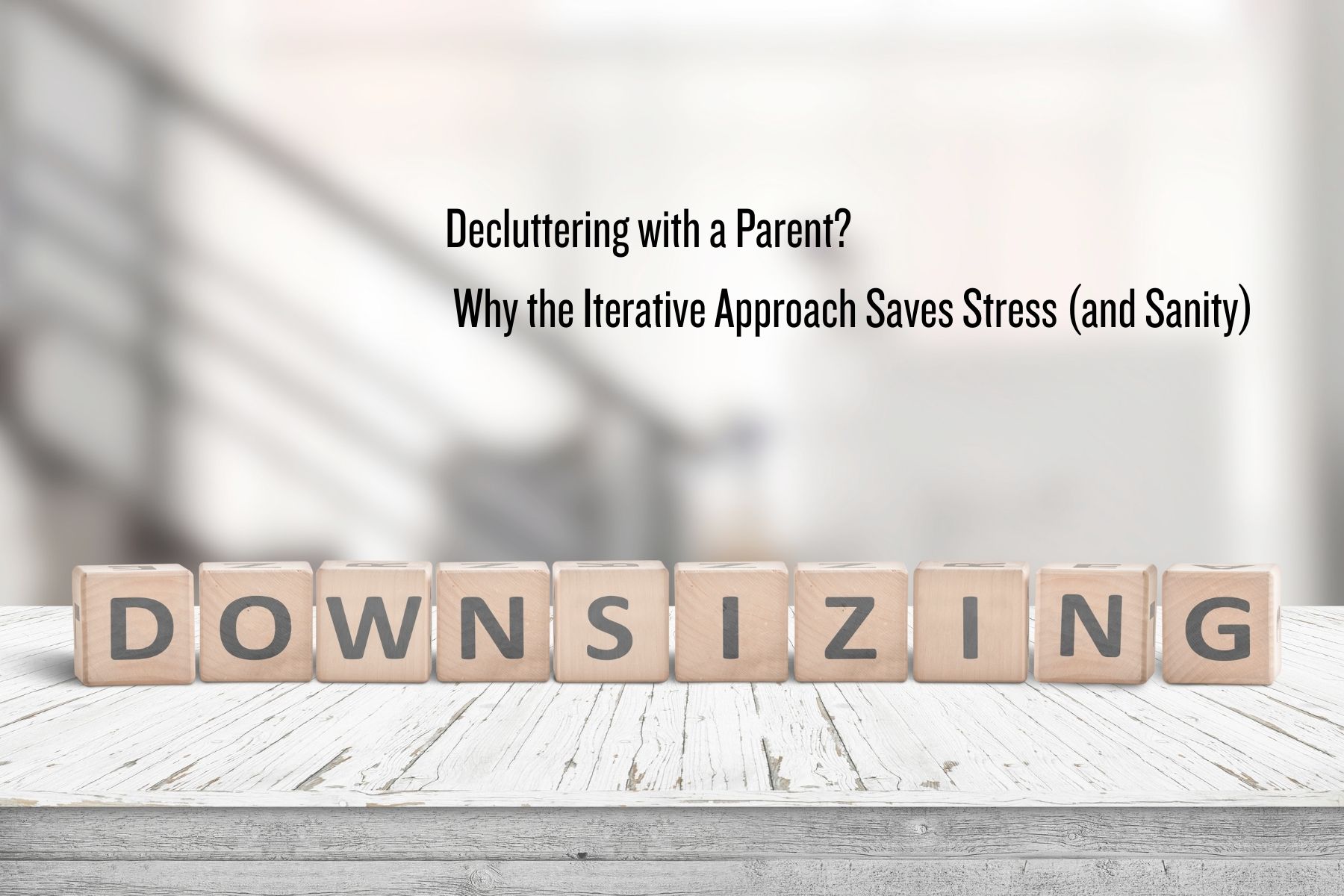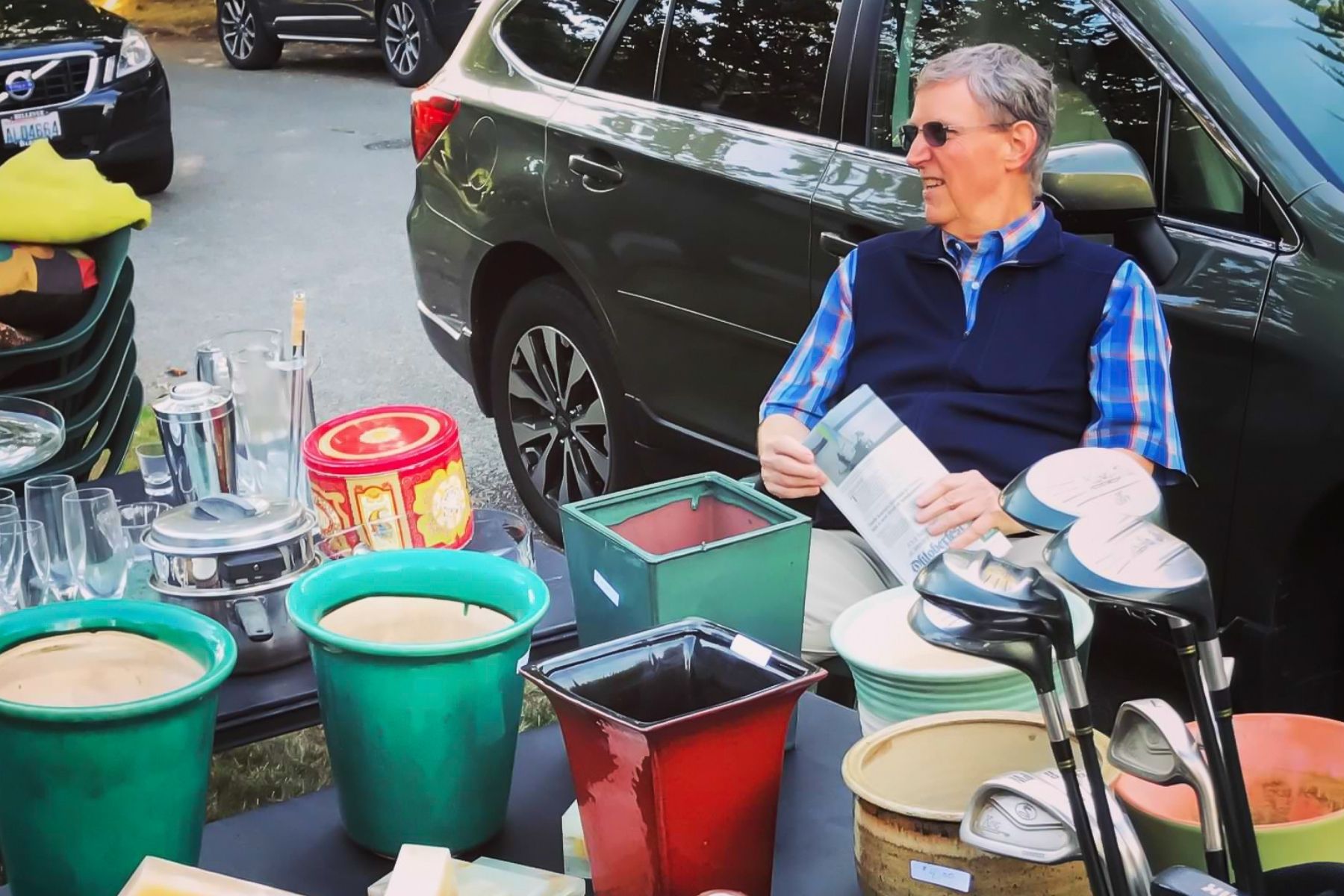Decluttering with a Parent? Why the Iterative Approach Saves Stress (and Sanity)
As an Amazon Associate and member of other affiliate programs, I earn from qualifying purchases.

If you’ve been following along, you know I recently helped my dad declutter his house and move to a smaller home in a retirement community. I learned so many important lessons through this experience that I can feel a second book coming on (I know, I know – finish the first one first!) and since I can’t wait to share the best nuggets, I’m devoting all August blogs to this topic. This week I’m sharing the wisdom of an iterative approach to decluttering and downsizing.
My dad’s decluttering experience unfolded over the course of 8 years. It was circumstance, not intention, driving the iteration. But as I look back on how it unfolded, I would plan it the exact same way if I was doing it all over again. There are so many reasons why an iterative approach is beneficial for all parties involved. I recognize that not everyone has the good fortune to be able to plan ahead for this eventuality. But if you or your parents do, here are 3 of the most compelling reasons to take an iterative approach.
1. You can make the best decisions without a forcing function

Eight years ago my mother had a second stroke that landed her in the Assisted Living wing of the retirement community my parents had planned to eventually move to. At that point my dad declared his intention to participate in his neighborhood yard sale. His plan was to clear some stuff out before selling their house and moving to the retirement community to be near my mom.
I was still in the thick of my Nordstrom career then, but came over for several hours each weekend to help him sort through things, ask my mom what was important to her and rescue anything I wanted to keep from the yard sale. We took an iterative approach of a couple hours a week over many months.
It sounds weird, I know, but these were fun times for me. We were not in a big hurry. There was time to identify whole categories of stuff that they wouldn’t need in their new living situation. We came across lots of old memorabilia and had time to talk about what it was, what it meant and why they kept it. I began a ritual of going to visit my mom immediately after we had finished a decluttering session and bringing along some of what we had found that day.
Through this process we let go of a lot of stuff. My parents were probably not going to be hosting any more large gatherings, so we decluttered all of my mom’s tabletop entertaining servingware. We said goodbye to most of their holiday decorations (well, some of them came to my house!) It was clear that my mom’s bike, skis and other equipment from the active lifestyle she had led were no longer needed.
In the end we decluttered a lot, but we also identified things that were important to keep. The decisions were practical, and because there was no time pressure they weren’t especially hard. Sure, we stirred up some emotions, but they weren’t crippling because we were operating from a baseline of calm.
2. It’s easier to break up a big job

That turned out to be Chapter One of our iterative approach. My dad did not end up selling the house because my mom passed away the following Spring. Since his health was good and liked his house and his community he stayed in his house. Then a few years ago he thought he might be ready to make a move. He was growing tired of the maintenance involved with owning an older home. He didn’t have a firm plan but knew he was getting closer to being ready.
Now by this point I had retired from Nordstrom and was already in deep with my Professional Organizing business. I had a whole new appreciation for decluttering and what it takes to truly go through a whole home full of stuff. I suggested that we tack on an extra 20 minutes at the end of our weekly walk to do some decluttering.
We hit one or two drawers at a time and focused on his current needs. We didn’t worry about ‘what would fit’ in a new, much smaller home. And the efforts so small that they didn’t feel like a big deal. I took any donations with me when I left and swung by the Goodwill on my way home to drop them off. Easy breezy. What I now realize is how truly paralyzing the thought of going through an entire household, an entire life can be. When you remove that prospect, the job at hand is so simple it hardly feels like work at all. So the decisions come easier. And as you continue the small efforts, you build decision-making muscle. This leads to covering twice the ground in the same 20 minutes as your new muscles grow. It’s quite something.
3. Because your feelings change over time

That was Chapter 2 of our iterative approach. It took another 2 years for my dad to move for a few reasons. He wanted to wait for the right place to open up, wasn’t quite ready to give up his woodshop, and enjoyed hosting his clarinet group in his respurposed dining-room.
But eventually the stars aligned, and when they did we had only a couple of weeks to declutter and make decisions before the movers showed up.
I have to admit, I was feeling pretty cocky. I mean, we had been decluttering consistently for the past 2 years! Most of the decisions left to make were really about furniture and art, right? Wrong. There was still so much left to do and so many decisions to make. I wouldn’t go so far as to say it was overwhelming, but we definitely had our work cut out for us – despite all we had already accomplished.
And here is where the final pearl of wisdom revealed itself. We came across many things that had, in prior iterations of decluttering, been objects worth saving. My dad had made thoughtful, unhurried decisions about what he wanted to keep. And then things changed. I’m not referring to any seismic shifts, per se, just small alterations of opinion or priority. When he came upon these items again, he recognized that they didn’t mean as much to him now. And because he was already well-seasoned in the art of decluttering, he easily identified the shift in priority and let them go. It was so cool! (I know, I’m geeking out but stay with me!)
Iteration Is Bliss
So you’re getting my point here? A little iteration makes this job, this chore, this thing people dread into a potentially pleasant experience. An iterative approach will spare tension and frustration in parent-child relations. And so I make this offering is praise of the iterative approach, may you take it – and prosper!







Method Seattle Comment Policy
We welcome relevant and respectful comments. Off-topic comments may be removed.